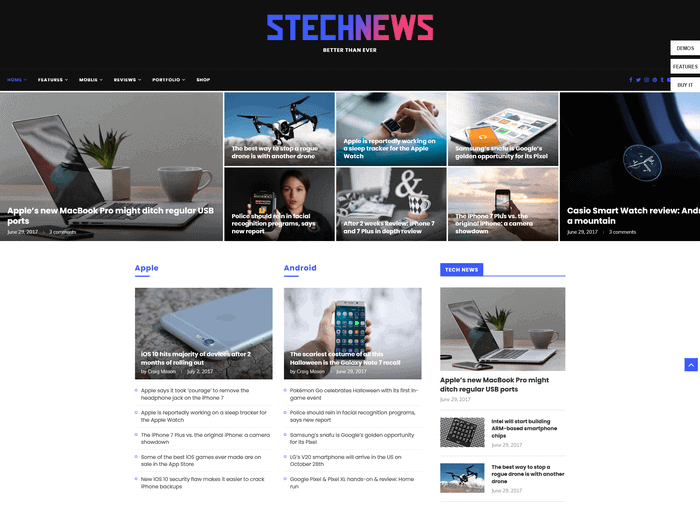Why the Best tech blog is Your Best Source for Professional Reviews and Insights
Why the Best tech blog is Your Best Source for Professional Reviews and Insights
Blog Article
How Blockchain Technology Is Revolutionizing Data Security
Blockchain modern technology is fundamentally altering the landscape of information protection by presenting a decentralized structure that assures boosted openness and durability. Unlike conventional systems, which count on centralized information databases, blockchain disperses data across a network, decreasing susceptabilities and single points of failing. Making use of sophisticated cryptographic techniques ensures that data continues to be tamper-proof, cultivating depend on among customers and stakeholders. As markets rapidly adjust to this modern technology, concerns arise concerning its wider impact and possible difficulties. What implications does this change hold for future data protection approaches and regulatory structures? The responses may stun you (Best tech blog).
The Essentials of Blockchain
Blockchain innovation, an advanced concept in electronic information management, essentially transforms how info is stored and protected. At its core, a blockchain is a dispersed ledger that tape-records purchases across a network of computers, making sure openness and immutability. The technology runs on a chain of blocks, each having a listing of transactions. When a block is loaded, it is time-stamped and connected to the previous block, creating a chronological chain.
Key to comprehending blockchain is the hashing process, which secures purchase information right into a special alphanumeric code. This cryptographic feature guarantees that any change in the purchase information causes an entirely various hash, consequently guarding versus meddling. The agreement system, one more important element, verifies and validates brand-new purchases with a network of nodes, consequently getting rid of the requirement for a centralized authority.
Additionally, blockchain's append-only structure makes certain that information, when added, can not be removed or modified. This characteristic guarantees a proven and permanent document of purchases, cultivating trust amongst individuals. Consequently, blockchain offers a robust structure for data integrity, supplying markets a trustworthy technique for tracking and handling digital details in a safe, transparent fashion.
Decentralization and Safety And Security
Decentralization, a core principle of blockchain technology, substantially enhances data safety by dispersing control throughout a network instead than relying upon a single, centralized entity. This distribution minimizes the danger of solitary points of failing, which prevail in typical central systems. By distributing information across many nodes, blockchain guarantees that also if one node is endangered, the entire network remains protected. This redundancy not only strengthens the integrity of the information but likewise increases its durability to cyberattacks and system failings.

Each individual in the network has access to the whole blockchain, enabling them to validate and audit deals individually. In general, decentralization is crucial in enhancing data safety and security in blockchain networks.

Cryptographic Strategies
At the heart of blockchain technology, cryptographic methods play a critical duty in guarding data, making certain both privacy and integrity. Cryptography in blockchain employs a combination of symmetrical and crooked algorithms to secure data, making it available just to accredited events.
Hash features are another crucial component, changing input information into a fixed-size string of personalities, successfully developing a special digital finger print for each block. This guarantees that any type of attempt to alter the data will result in a completely various hash, therefore maintaining the immutability of the blockchain. Additionally, electronic signatures confirm the authenticity and stability of deals, providing a layer of non-repudiation.
The decentralized nature of blockchain, combined with durable cryptographic strategies, gets rid of the need for middlemans, reducing prospective susceptabilities. As blockchain innovation develops, advancements in cryptography such as zero-knowledge proofs and homomorphic encryption remain to boost security procedures, additionally fortifying data defense in this revolutionary digital ledger system.
Usage Situations Throughout Industries

In the medical care market, blockchain ensures the secure storage and sharing of patient records, promoting interoperability while safeguarding delicate data from unapproved access. This innovation empowers people with control over their case history and assists in seamless coordination among doctor.
Supply chain administration advantages considerably from blockchain's unalterable ledger, which makes certain traceability and credibility of products from origin to consumer. By improving transparency, blockchain assists alleviate concerns such as counterfeiting and underhanded sourcing.
In addition, blockchain's decentralized nature is reshaping the power market by allowing peer-to-peer power trading, where consumers can deal excess renewable resource straight. This cultivates a more effective and sustainable energy environment.
In the world of intellectual building, blockchain gives a tamper-proof platform for creators to sign up and safeguard their jobs, making certain rightful attribution and reasonable settlement. These varied usage cases underscore blockchain's function as a pivotal force in redefining information security across sectors.
Future of Information Security
As we want to the future of information protection, blockchain technology is positioned to play a critical duty in safeguarding digital information. With its decentralized and unalterable characteristics, blockchain uses a durable framework for securing sensitive information against unauthorized access and cyber dangers. This modern technology ensures that once data is videotaped, it is nearly difficult to change without discovery, hence giving a considerable advantage over conventional data storage approaches.
The assimilation of blockchain with various other innovative modern technologies, such as synthetic knowledge and the Net of Points (IoT), is expected to boost data protection strategies additionally. By leveraging wise contracts, Get More Information organizations can automate and implement safety and security methods, decreasing human error and increasing efficiency. Furthermore, blockchain's look at this now capacity to give clear and deducible deals will strengthen trust fund and responsibility in data administration practices.
As regulative landscapes advance, blockchain's compliance-friendly nature will certainly become increasingly relevant. It can aid organizations satisfy rigorous data security guidelines, such as the General Information Security Regulation (GDPR) and the California Customer Personal Privacy Act (CCPA), by supplying proven documents of information processing activities. Eventually, blockchain's special qualities position it as a transformative device in the continuous quest to secure the electronic globe versus ever-evolving cyber risks.
Conclusion
Blockchain modern technology represents a standard shift in information security by leveraging decentralization and cryptographic techniques to boost transparency, count on, and information stability. Its capacity to eliminate single factors of failing and employ consensus devices significantly decreases the danger of scams and cyberattacks. This innovative structure not just empowers customers with greater control over their data yet also lines up with regulative compliance. As cyber hazards advance, blockchain emerges as a vital tool for durable data defense across click here to find out more different markets.
Blockchain innovation is fundamentally modifying the landscape of data protection by introducing a decentralized structure that assures boosted transparency and resilience. Unlike conventional systems, which depend on central information databases, blockchain distributes information throughout a network, decreasing vulnerabilities and solitary factors of failing.Decentralization, a core concept of blockchain technology, considerably improves data safety by dispersing control throughout a network instead than depending on a particular, centralized entity.At the heart of blockchain modern technology, cryptographic techniques play an essential role in guarding data, ensuring both privacy and integrity.Blockchain technology represents a paradigm change in information safety by leveraging decentralization and cryptographic techniques to improve transparency, count on, and data honesty.
Report this page